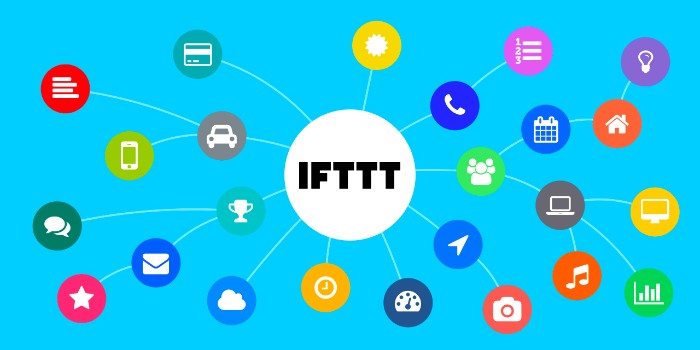It's no secret that small businesses face unique challenges when it comes to managing their operations. One large issue that many businesses face is juggling hundreds of small repetitive tasks in order to keep the whole system running smoothly.
Automation is one tool that can help small business owners free up time and resources, allowing them to focus on growing their businesses. In 2025, there are several tasks that small businesses should strongly consider automating in order to stay competitive and efficient.
In this article, we will go over the tasks that businesses can automate, the best ways to maximize productivity, as well as offer an automation solution with our service, IFTTT.
Small business automation
BTW, IFTTT is our small business automation tool, that can help you streamline your daily work with the click of a button. We're free to start and you can automate everything from your Calendar to Email and Social Media. Join for free today!
Why is automation so important for businesses?

Automation plays a crucial role in modern businesses for several reasons:
Increased efficiency: Automation helps streamline repetitive tasks, reducing the time and effort required to complete them. By automating processes, businesses can improve efficiency, allowing employees to focus on more strategic and value-added activities.
Cost savings: Automating tasks can lead to significant cost savings for businesses. It reduces the need for manual labor, eliminates human errors, and minimizes operational expenses associated with repetitive tasks. With automation, businesses can achieve higher productivity levels with fewer resources.
Enhanced accuracy: Manual tasks are prone to human errors, which can lead to costly mistakes. Automation ensures a higher degree of accuracy and consistency in performing tasks, reducing the risk of errors and improving overall quality.
Scalability: As businesses grow, manual processes become increasingly difficult to manage. Automation provides scalability, allowing businesses to handle a larger volume of tasks without the need for additional human resources. This helps businesses adapt to changing demands and scale their operations effectively.
Data-driven insights: Automation generates vast amounts of data that can be analyzed to gain valuable insights. Businesses can use these insights to make informed decisions, identify trends, optimize processes, and drive continuous improvement.
Overall, automation empowers businesses to operate more efficiently, reduce costs, improve accuracy, and deliver better customer experiences. By leveraging automation technologies, businesses can stay ahead in a highly competitive market and focus on strategic initiatives that drive growth and innovation.
Which tasks should my business focus on automating?
Of all the tasks that businesses can automate, there are some that provide the greatest benefits. This is by no means an exhaustive list, and one can discover that with IFTTT, you can automate almost every aspect of a business.
Automating calendars and appointment schedulers

Automating calendars and appointment schedulers can be hugely beneficial for small businesses. By automating these processes, businesses are able to free up resources that can be put towards more important tasks, such as marketing or product development. This also ensures accuracy when it comes to setting appointments and scheduling meetings - an essential task for any business.
Automating calendars and appointment schedulers can help improve customer service by automatically scheduling follow-up meetings or providing timely reminders about upcoming appointments. Additionally, automation allows businesses to easily track their appointments over time, providing valuable insights into the effectiveness of their operations.
Lastly, automated systems are less prone to errors caused by manual entry or human error - ensuring accuracy and reliability in all areas of the business.
Automating a customer relationship management (CRM) system

Small businesses should automate their customer relationship management (CRM) system as soon as possible in order to increase efficiency and optimize their sales processes.
Using an automation tool makes it easier to track customer interactions, such as emails, phone calls, meetings, and other engagements. Therefore, businesses can quickly identify opportunities for follow-up or further engagement with the customer.
Automation can help streamline the process of creating and managing customer profiles, making it easier for businesses to log important information such as preferences, purchase history, and contact details. Automated CRM systems can make it simpler to segment customer information into different categories based on criteria like purchase frequency or spending habits.
This can make it easier for small businesses to target specific groups of customers with relevant promotions or offers that suit their needs.
Automating social media
Automating social media is one of the best ways for small businesses to maximize the reach and impact of their messaging. Adding automatic social media allows businesses to quickly post content across multiple platforms simultaneously, saving time and effort that would otherwise be spent manually entering data for each platform.
Social media automation makes it easier to segment customers into different target audiences, allowing companies to customize their messages and tailor them more effectively toward specific groups. This increases the chances of engagement with potential customers, as well as providing higher value content that is tailored specifically to their needs.
Automated systems can also help small businesses track user engagement with their posts – providing valuable insights into which types of content perform best. This helps small businesses focus their efforts on creating content that resonates with their audience in order to build better relationships and foster loyalty over time.
Automatic email marketing

Email marketing automation allows small businesses to quickly create, send, and track emails to their customers in an efficient and cost-effective manner. Automated email campaigns save time and resources by eliminating the need for manual entry of data, as well as streamlining the process of creating content and customizing messages.
Furthermore, automated email marketing helps small businesses track user interactions with their emails in order to measure engagement and inform future campaigns. This is crucial, as companies can adjust their approach or messaging depending on what works best with their target audiences.
Automation also makes it simpler to set up automated follow-up emails that are triggered based on customer behavior, such as opening an email or clicking a link within it. Enabling this gives obvious benefits, and lets businesses better nurture relationships with their customers by providing timely updates or relevant offers tailored towards their needs.
Automating cloud storage

Automating cloud storage may not be the most obvious choice for businesses to think of, but it can be incredibly helpful nonetheless.
By automating their cloud storage, small business owners can quickly upload and retrieve their documents from the cloud, eliminating the need for manual entry of data. Second, automation can better control user-access and privacy settings, ensuring that only authorized personnel can access sensitive documents.
To avoid data loss, automated backups can be scheduled to run on a predetermined basis, such as daily or weekly – allowing companies to keep up-to-date copies of all their vital information with minimal effort.
Finally, utilizing cloud storage automation tools enables companies to collaborate more effectively by providing secure access to shared documents across different teams or departments.
Automating communication services

Automating internal communication can drastically improve the efficiency of communication between teams and groups. Automation tools help streamline many of the tedious manual processes that are associated with traditional communication methods, such as email and phone calls. It also enables small businesses to quickly send more targeted messages to specific groups or individuals, allowing them to easily keep their employees informed and up-to-date on important company matters.
Additionally, automating internal communication gives employers more control over how they communicate internally, enabling them to customize their messaging and ensure that appropriate policies are being followed. Business can then tailor their internal communications in a way that is most effective for their organization and ensures that employees are properly engaged and motivated.
An automated communication system can also enable companies to schedule messages ahead of time or create automated responses for frequently asked questions – saving both time and money in the long run.
Surveys and customer feedback

Here's another essential task for any small business that can be made much easier. By automating their feedback process, companies can cut back on budget while improving the accuracy of their data collection.
Automated surveys and feedback systems allow businesses to gather real-time insights about customer experiences, enabling them to quickly identify areas in which they need to improve or address more closely. These systems can later let companies view customer responses over time – giving them a clearer understanding of trends and patterns in consumer behavior.
Automation also makes it easier for businesses to analyze large sets of data – allowing them to identify correlations and relationships between different variables. One could then uncover new opportunities or potential problems that they may not have been aware of before, allowing them to make informed decisions and maximize their success.
By automating their surveys and customer feedback processes, small businesses can gain valuable insights into what their customers want, and how they feel about the company’s products and services, as well as identify where improvements can be made.
Automating business processes with IFTTT
So, now that we know how important it is to automate all of these pesky tasks- how do we go about automating them?
This is where IFTTT steps up to the batter's box. With our constantly-growing catalog of integrations, you will be sure to find exactly what you need to knock mundane tasks out of the park. Let us explain:
IFTTT stands for “If This, Then That” and is our cloud-based platform that allows users to create automated workflows – or “Applets” – that simplify the process of managing everyday tasks. With IFTTT, users can set up custom triggers such as “if an email arrives in my inbox, then add it to my calendar” or “if a customer posts a comment on Twitter, then send them a thank you email”.
IFTTT provides a user-friendly interface and allows users to manage their applets from a central dashboard. We offer a free version with all of the essential features and also provides premium plans for advanced functionality.
Businesses that automate with IFTTT are also able to gain insights into their operations through connections with over 800 supported apps, allowing them to make informed decisions to better manage a variety of processes. Overall, we are convinced that automating with IFTTT provides businesses with many valuable benefits when it comes to effectively managing their operations.
The best part? You can try IFTTT today for free, with only a few clicks of a mouse!

